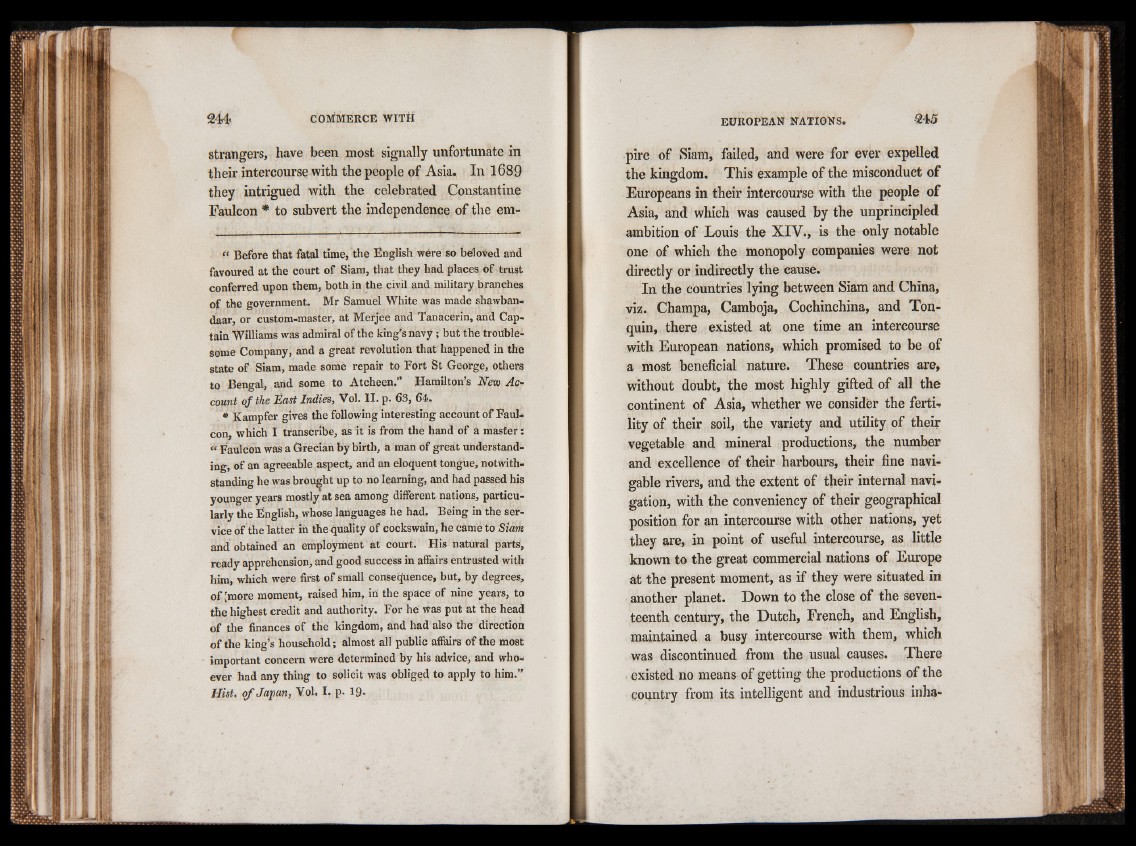
strangers, have been most signally unfortunate in
their intercourse with the people of Asia. In 1689
they intrigued with the celebrated Constantine
Faulcon * to subvert the independence of the em“
Before that fatal time, the English were so beloved and
favoured at the court of Siam, that they had places of trust
conferred upon them, both in the civil and military branches
of the government. Mr Samuel White was made shawban-
daar, or custom-master, at Merjee and Tanacerin, and Captain
Williams was admiral of the king’s navy; but the troublesome
Company, and a great revolution that happened in the
state of Siam, made some repair to Fort St George, others
to Bengal, arid some to Atcheen.” Hamilton’s Nem Ac•
count of the East Indies, Vol. II. p. 63, 64.
* Kampfer gives the following interesting account of Faulcon,
which I transcribe, as it is from the hand of a master i
“ Faulcon was a Grecian by birth, a man of great understanding,
of an agreeable aspect, and an eloquent tongue, notwithstanding
he was brought up to no learning, and had passed his
younger years mostly at sea among different nations, particularly
the English, whose languages he had. Being in the service
of the latter in the quality of cockswain, he came to Siam
and obtained an employment at Court. His natural parts,
ready apprehension, and good success in affairs entrusted with
him, which were first of small consequence, but, by degrees,
of [more moment, raised him, in the space of nine years, to
the highest credit and authority. For he Was put at the head
of the finances of the kingdom, and had also the direction
of the king's household; almost all public affairs of the most
important concern were determined by his advice, and whoever
had any thing to solicit was obliged to apply to him.”
Hist, o f Japan, Vol. I. p- 19*
pire of Siam, failed, and were for ever expelled
the kingdom. This example of the misconduct of
Europeans in their intercourse with the people of
Asia, and which was caused by the unprincipled
ambition of Louis the XIV., is the only notable
one of which the monopoly companies were not
directly or indirectly the cause.
In the countries lying between Siam and China,
viz. Champa, Camboja, Cochinchina, and Ton-
quin, there existed at one time an intercourse
with European nations, which promised to be of
a most beneficial nature. These countries are,
without doubt, the most highly gifted of all the
continent of Asia, whether we consider the fertility
of their soil, the variety and utility of their
vegetable and mineral productions, the number
and excellence of their harbours, their fine navigable
rivers, and the extent of their internal navigation,
with the conveniency of their geographical
position for an intercourse with other nations, yet
they are, in point of useful intercourse, as little
known to the great commercial nations of Europe
at the present moment, as if they were situated in
another planet. Down to the close of the seventeenth
century, the Dutch, French, and English,
maintained a busy intercourse with them, which
was discontinued from the usual causes. There
existed no means of getting the productions of the
country from its. intelligent and industrious inha